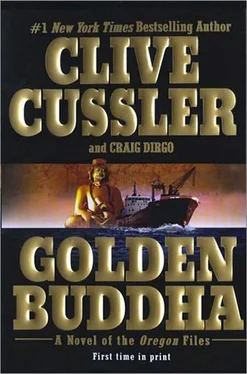Clive Cussler - Golden Buddha
Здесь есть возможность читать онлайн «Clive Cussler - Golden Buddha» весь текст электронной книги совершенно бесплатно (целиком полную версию без сокращений). В некоторых случаях можно слушать аудио, скачать через торрент в формате fb2 и присутствует краткое содержание. Жанр: Морские приключения, на английском языке. Описание произведения, (предисловие) а так же отзывы посетителей доступны на портале библиотеки ЛибКат.
- Название:Golden Buddha
- Автор:
- Жанр:
- Год:неизвестен
- ISBN:нет данных
- Рейтинг книги:3 / 5. Голосов: 1
-
Избранное:Добавить в избранное
- Отзывы:
-
Ваша оценка:
- 60
- 1
- 2
- 3
- 4
- 5
Golden Buddha: краткое содержание, описание и аннотация
Предлагаем к чтению аннотацию, описание, краткое содержание или предисловие (зависит от того, что написал сам автор книги «Golden Buddha»). Если вы не нашли необходимую информацию о книге — напишите в комментариях, мы постараемся отыскать её.
Golden Buddha — читать онлайн бесплатно полную книгу (весь текст) целиком
Ниже представлен текст книги, разбитый по страницам. Система сохранения места последней прочитанной страницы, позволяет с удобством читать онлайн бесплатно книгу «Golden Buddha», без необходимости каждый раз заново искать на чём Вы остановились. Поставьте закладку, и сможете в любой момент перейти на страницу, на которой закончили чтение.
Интервал:
Закладка:
“Leave tonight! Go.”
Then, still with his eyes closed, still in a trance, he rose, walked over to a table and stopped exactly one foot away. Then he reached down, picked up a quill pen, dipped it in ink and drew a detailed map on a sheet of paper before collapsing to the ground.
The Dalai Lama rushed to the oracle’s side, lifted his head and patted his cheek. Slowly, the man began to awaken. After sliding a pillow under his head, the Dalai Lama rose and poured a cup of water from an earthenware pitcher. Carrying the cup back to the oracle, he placed it under his lips.
“Sip, Dorje,” he said quietly.
Slowly, the older man recovered and pulled himself to a seated position. As soon as the Dalai Lama was sure the oracle was on the mend, he walked over to the table and stared at the ink drawing.
It was a detailed map showing his escape route from Lhasa to the Indian border.
OVERHOLT had been born into his career. At least one Overholt had served in every war the United States had fought since the Revolutionary War. His grandfather had been a spy in the Civil War, his father during World War I, and Langston the third had served in the OSS in World War II before switching to the CIA when it’d been formed in 1947. Overholt was now thirty-three, with a fifteen-year history of espionage.
In all that time, Overholt had never seen a situation quite this ominous. This was not a king or a queen in peril, not a pontiff or dictator. This was the head of a religion. A man who was a God-king, a deity, a leader that traced his lineage back to A.D. 1351. If something did not happen quickly, the communist scourge would soon be taking him prisoner. Then the human chess match would be over.
IN Mandalay, Burma, Overholt’s message was received and forwarded to Saigon where it was transferred to Manila, then over a secure underwater cable to Long Beach, California, then on to Washington, D.C.
As the situation in Tibet continued to deteriorate, the CIA started to assemble a force in Burma. The group was not large enough to defeat the Chinese, just large enough to slow them down until more heavily armed ground troops could be brought to bear.
Disguised as a front company named Himalayan Air Services, the armada consisted of fourteen C-47s: ten that could drop supplies and four that had just been converted to first-generation gunships. This force was augmented with six F-86 fighters and a lone, fresh-off-the-assembly-line Boeing B-52 heavy bomber.
ALAN Dulles sat in the Oval Office, puffing on his pipe and pointing out the situation to President Eisenhower. Then the CIA director sat back and let the president think for a moment. Several minutes passed in silence.
“Mr. President,” he said at last, “the CIA took the liberty of arranging a first-strike force in Burma. If you say the word, they’ll be airborne in an hour.”
Since his election in 1952, Eisenhower had faced the McCarthy hearings, the first advisors into Vietnam and a heart attack. He’d had to order ten thousand troops to Little Rock, Arkansas, to enforce integration; witness the Soviets take the lead in space; and have his vice president stoned by hostile crowds in Latin America. Now Cuba had a communist leader only ninety miles from U.S. soil. He was weary.
“No, Alan,” he said quietly, after a pause. “I learned as a general that you have to know how to pick your fights. We need to stay clear of this Tibet situation right now.”
Dulles rose and shook Eisenhower’s hand. “I’ll notify my men,” he said.
In Overholt’s command post in Lhasa, the ashtray on the table near the radio was filled with the stubs of unfiltered cigarettes. Hours passed, with only the confirmation that the radio transmission had been received. Every half hour, Tibetan messengers delivered intelligence. Visual reconnaissance reported that the crowds outside the palaces near Lhasa were growing minute by minute, but the messengers were unable to take an accurate count. Tibetans continued to stream down from the mountains, armed with sticks, rocks and knives. The milling mass would be cannon fodder for the well-armed Chinese.
So far the Chinese had taken no action, but the reports mentioned troop buildups on the roads leading into the fabled city. Overholt had seen this same scenario unfold five years ago in Guatemala, when a crowd supporting the anticommunist rebels under Carlos Armas had suddenly sparked. Chaos had ensued. Forces under President Jacobo Arbenz had begun to fire into the crowd to restore order, and before dawn broke, the hospitals and morgues had been filled to capacity. Overholt had organized the demonstration and the knowledge clouded his mind like a shroud.
Just then the radio crackled.
“Top Hat negative, over.”
Overholt’s heart skipped a beat. The planes he sought were not coming.
“Papa Bear will okay sweeping the path if critically necessary during extraction. Advise on departure and subsequent travel, over.”
Eisenhower said not to attack Lhasa, Overholt thought, but Dulles has agreed to cover the escape out of Tibet on his own, if it came to that. If he worked things right, Overholt thought, he wouldn’t need to put his boss’s ass on the line.
“Sir?” the radio operator asked.
Overholt was jarred from his thoughts.
“They’re expecting a reply,” the operator said quietly.
Overholt reached for the microphone. “Acknowledged and agreed,” Overholt said, “and thank Papa Bear for the gesture. We’ll call from the road. Closing office, over.”
The radio operator stared up at Overholt. “Guess that’s that.”
“Break it all down,” Overholt said quietly, “we’ll be leaving soon.”
INSIDE the yellow wall, preparations for the Dalai Lama’s escape into exile were moving at a blistering pace. Overholt was cleared past the guards and waited to be seen. Five minutes later, the Dalai Lama, wearing his black-framed prescription glasses and yellow robes, entered the office in the administration room. The spiritual leader of Tibet looked weary but resigned.
“I can tell by your face,” he said quietly, “no help is coming.”
“I’m sorry, Your Holiness,” Overholt replied. “I did all that I could.”
“Yes, Langston, I am certain you did. However, the situation is as it is,” the Dalai Lama noted, “so I have decided to go into exile. I cannot risk the chance of my people being slaughtered.”
Overholt had arrived expecting to use all his powers of persuasion to convince the Dalai Lama to flee—instead he found the decision had already been made. He should have expected as much—over the years he had grown to know the Dalai Lama, and he had never seen anything that made him doubt the leader’s commitment to his people.
“My men and I would like to accompany you,” Overholt offered. “We have detailed maps, radios and some supplies.”
“We’d be glad to have you come along,” the Dalai Lama said. “We leave shortly.”
The Dalai Lama turned to leave.
“I wish I could have done more,” Overholt said.
“Things are as they are,” the Dalai Lama said at the door. “For now, however, you should assemble your men and meet us at the river.”
HIGH above Norbulingka, the sky was dotted with a trillion stars. The moon, only days away from being full, lit the ground with a yellow diffused glow. A stillness, a quiet. The night birds that normally warbled their haunting songs were silent. The domesticated animals inside the compound—musk deer, mountain goats, camels, a single aged tiger and the peacocks that ran loose—barely stirred. A light wind from high in the Himalayas brought the scent of pine forests and change.
From high on a hillside outside Lhasa came the chilling scream of a snow leopard.
Читать дальшеИнтервал:
Закладка:
Похожие книги на «Golden Buddha»
Представляем Вашему вниманию похожие книги на «Golden Buddha» списком для выбора. Мы отобрали схожую по названию и смыслу литературу в надежде предоставить читателям больше вариантов отыскать новые, интересные, ещё непрочитанные произведения.
Обсуждение, отзывы о книге «Golden Buddha» и просто собственные мнения читателей. Оставьте ваши комментарии, напишите, что Вы думаете о произведении, его смысле или главных героях. Укажите что конкретно понравилось, а что нет, и почему Вы так считаете.












